Madison teen athlete's new team huddles at UMMC
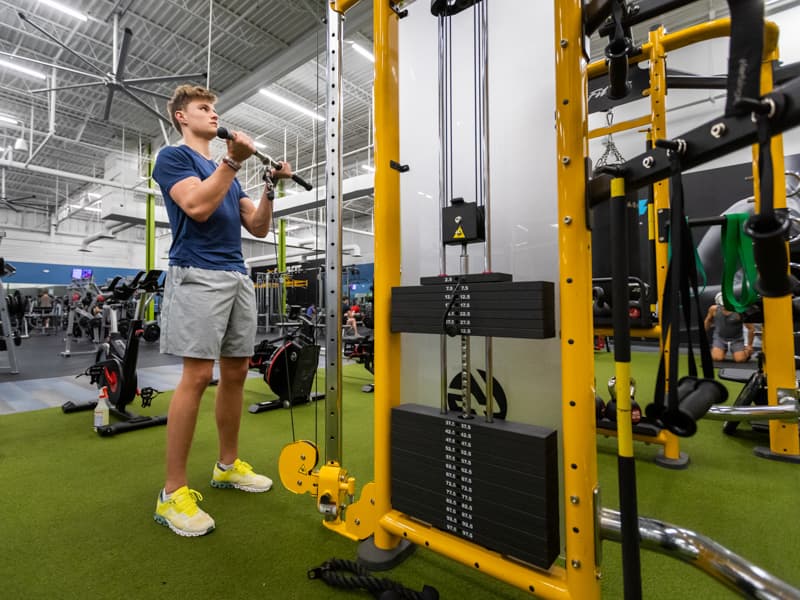
Jack Houston doesn’t remember the day he almost died, but he and his University of Mississippi Medical Center health care team know he’s lucky to be alive.
It was August 27, 2019. Jack, then a sophomore tight end on the Madison Central High football team, was on the practice field with his fellow athletes.
“He ran one route, and then he just face-planted,” said his mom, Macy Wilkerson of Madison.
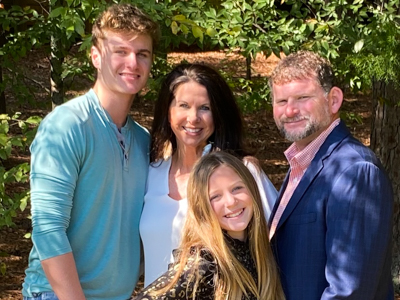
Jack passed out after experiencing ventricular cardiac arrhythmia, a life-threatening condition that causes the heart to beat irregularly. “One of the players ran and got the trainer, Josh Hardin. He was phenomenal,” Wilkerson said. “He cut his pads off and started the use of the AED. I recall Josh said they had to shock him four or five times.”
“It was the very beginning of practice, and I was still in the field house taking care of a couple of athletes,” said Hardin, a certified athletic trainer at the Madison Healthplex Performance Center. “One of his teammates ran up and said we had a player down.”
He rushed to Houston’s side. “Jack was not responsive,” he said. “His face was turned to the side, and his lips had started turning blue.”
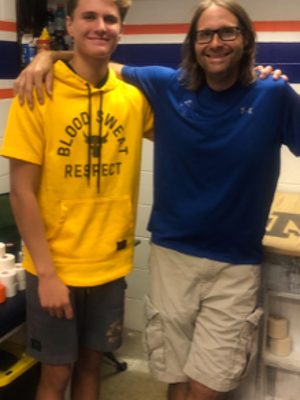
Hardin called 911. “When you see a player down, you assume a neck injury. I got the coaches positioned, and we log-rolled him to protect his neck. I had to get to his airway. I knew that I had to get an AED (automated external defibrillator) on him because he had no pulse,” Hardin said.
Jack was experiencing agonal respiration, or gasping for breath that happens in unconscious people experiencing cardiac arrest. It means uninterrupted CPR must be given immediately. “At that point, life becomes more important than function,” Hardin said.
Hardin shocked Jack with the AED and began CPR. Madison Fire Department paramedics, then an ambulance, arrived swiftly. “From the time he fell out until he rolled in to UMMC was probably 15 minutes,” Hardin said.
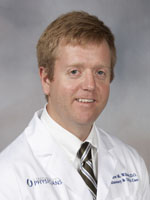
Dr. Andy Wilhelm, UMMC associate professor of pulmonology and medical director of the medical intensive care unit, was in the Adult Emergency Department treating a patient who was bound for the MICU. “When someone comes in who is critically ill, they call us to assume their care,” Wilhelm said.
“I walked by one of the treatment rooms and saw a lot of people working on a patient. I figured he would be coming to my ICU.”
It was Jack.
“We provided critical care and multi-organ support, and he was put on a ventilator. We were watching his heart and vitals in the ED to make sure it didn’t happen again, and we did the same thing in the ICU while we figured out what was happening with his heart,” Wilhelm said.
But even that early on in the ED, the diagnosis of a rare disease was being narrowed down. Dr. Lampros Papadimitriou, a cardiologist and assistant professor of medicine who treated Jack when he arrived, and electrophysiologist Dr Takeki Suzuki recognized that Jack met the criteria for a genetic heart problem.
Because Jack had been transported to the Adult Emergency Department, not UMMC’s Pediatric ED, he was treated in an adult ICU. Wilkerson had never been so frightened over her children’s health. “There had never been anything wrong with him. No high blood pressure. No irregular heartbeat. We’d never had a bad physical. He was a pillar of health,” she said.
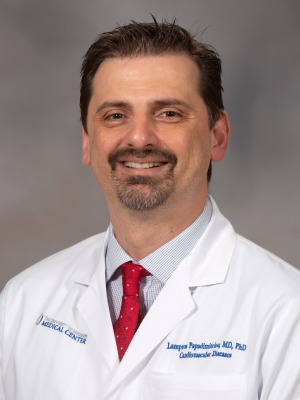
“The big question was: Why did Jack have this arrhythmia? That can be a big problem when a younger kid exercises and does sports,” Papadimitriou said.
Jack had a cardiac MRI and echocardiogram, and Dr. Brian Kirmse, associate professor of pediatric genetics, performed testing to confirm the diagnosis: arrhythmogenic right ventricular cardiomyopathy, or ARVC. It’s an inherited heart disease that usually appears in adulthood and affects the myocardium, or muscular wall of the heart.
Jack was extubated, or taken off the ventilator, after two days in the MICU and had surgery to implant a defibrillator in his chest.
The 17-year-old remembers nothing about the day he fell ill, and very little about his hospital stay. “I remember waking up, and I didn’t know where I was,” he said. “I lost 26 pounds, mostly in the hospital.”
“We introduced him to the proper heart failure medications, and we were able to discharge him in just four days,” Papadimitriou said. “That’s amazing for someone who had cardiac arrest, and requires very good coordination between teams from the Emergency Department, the medical ICU and cardiology.
“He’s just a little miracle,” Wilkerson said. “I cannot tell you how wonderful the staff and everyone at UMMC was.”
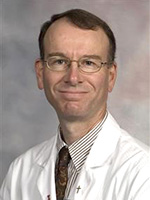
Jack has the most common type of ARVC, the PKP2 mutation, and it can be passed on by either parent, said Dr. Charles Moore, a cardiologist and professor of medicine, who’s also following Jack for his heart condition. “We think this occurs in one out of every 2,000-5,000 people,” Moore said. “Usually it first presents with palpitations or the person passing out, but there can also be sudden cardiac death, unfortunately.”
Not everyone with the mutation develops the disease, and it’s not uncommon for someone to remain undiagnosed, even though they’re having symptoms, Moore said. “Some might be carriers and never develop symptoms,” he said.
When someone like Jack is diagnosed with the mutation, he said, their parents and siblings need to be screened. In addition to his mom, Jack’s sister Kathleen Wilkerson was diagnosed with the mutation. Both mother and daughter are symptom-free, but must be followed by a cardiologist to catch changes that could signal manifestation of the heart condition.
“It was passed down from me,” said Wilkerson, who’s being followed by Dr. Michael Hall, a cardiologist and associate professor of medicine. “We found out all of this when Jack was diagnosed.”
Wilkerson and Kathleen might never develop the disease, Hall said. “There are no signs or symptoms sometimes – until that person has a bad outcome. Fortunately, Jack survived, but there are kids who die on the football field or on the basketball court.”
It’s that type danger that led Jack’s doctors to deliver news that can be crushing to a teen athlete: No more competitive team sports.
Because exercise and competitive athletics are associated with a progression of the disease, Moore said, patients are advised “not to do endurance or competitive sports to reduce their risk of sudden death, or that their disease will progress,” he said. “Patients later in life can develop heart failure symptoms.”
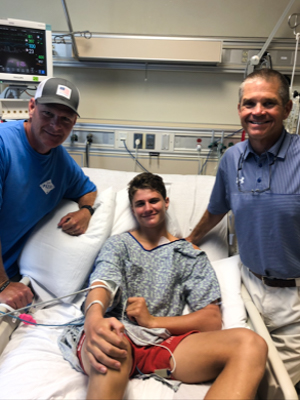
“It was a little rough on me. I was a good swimmer, too. That killed me,” Jack said. “But, I’m spending time with my family and doing weights. I can do some cardio. I’ve been fishing and hunting, and just doing outdoors stuff.”
“It was a challenge at first, but we’ve gotten beyond that,” his mom said. “He’s gotten a trainer who has taught him what he can and can’t do. He knows to watch his heart rate.”
Not only is Jack persevering, he’s thriving. “He was about six feet tall when it happened,” Wilkerson said. “He’s grown to six-three.”
Unless Jack develops new symptoms, Papadimitriou said, he will be seen by a UMMC cardiology team member every six months to a year. Jack’s medical team also includes Dr. Jimmy Hamilton, an electrophysiologist and assistant professor of medicine; and Dr. Ali Onder, associate professor of pediatric nephrology.
“I’m really happy to be able to provide this kind of care. He’s recovering fully without any problems,” Papadimitriou said.
Jack’s family and medical team give Hardin high praise. “A lot of athletes don’t have a Josh Hardin on their field,” Wilkerson said. “Had he been in the hallway, in the cafeteria, somewhere else, I don’t know if Jack would have made it. God put Josh with Jack.”
As the new school year approached, she said, “we contemplated whether Jack should go back to classes, but Dr. Moore and Dr. Papadimitriou and Dr. Hall all said to send him back. He’s good to go.
“It’s been a journey, but we are stronger because of it,” she said. “Jack has always been the child with the huge heart. Of all organs to be affected … it’s crazy.”


